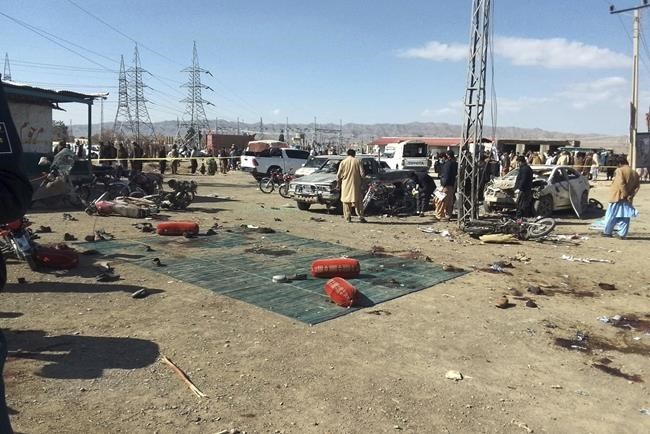QUETTA, Pakistan (AP) — A pair of bombings at the election offices of a political party and an independent candidate in southwest Pakistan killed at least 26 people and wounded more than two dozen others, officials said Wednesday, the day before parliamentary elections are to be held.
The first attack hit the election office of Asfandyar Khan in Pashin, a district in Baluchistan province, said Jan Achakzai, the spokesperson for the provincial government. Officials said at least 15 people were killed in the attack and the wounded are being transported to a nearby hospital. Police said some of them were listed in critical condition.
Later Wednesday, another bombing at the elections office of politician Fazlur Rehman's Jamiat Ulema Islam party in Qilla Saifullah town of Baluchistan killed at least 11 people, Acahkzai and local authorities said.
JUI is one of the leading radical Islamist party and is known for backing the Afghan Taliban. JUI’s religious schools are spread across the country, especially in the northwest and Baluchistan bordering Afghanistan. Many of Afghanistan’s Taliban leaders studied at Islamic seminaries operated by JUI, yet Rehman and his party leaders in recent years have been attacked by the Islamic State group and other militants. Rehman and scores of candidates from his party are contesting the elections from various parts of Pakistan.
No one immediately claimed responsibility for the attacks, which came a day before Pakistan holds parliamentary elections.
Caretaker Prime Minister Anwaarul-Haq-Kakar denounced the bombings in Baluchistan, and conveyed his condolences to the families of those who died. He vowed that “every attempt to sabotage the law and order situation will be thwarted.”
Kakar said the government is committed to holding elections in a peaceful environment.
Caretaker Interior Minister Gohar Ejaz also denounced the bombings, saying no one would be allowed to sabotage the election process.
The bombings came despite the deployment of tens of thousands of police and paramilitary forces across Pakistan to ensure peace following a recent surge in militant attacks in the country, especially in Baluchistan.
The outlawed Baluchistan Liberation Army has been behind multiple attacks on security forces, including a Jan. 30 attack on security facilities that killed six people.
In recent years, Pakistan has struggled to rein in surging militancy. Pakistani Taliban and other militant groups also have a strong presence in the Baluchistan province and have targeted civilians in recent years.
The gas-rich province at the border of Afghanistan and Iran has been the scene of a low-level insurgency by Baluch nationalists for more than two decades. Baluch nationalists initially wanted a share of the provincial resources, but later they initiated an insurgency for independence.
Violence ahead of elections and on the day of polling is common in Pakistan. In one of the worst such attacks, Pakistan’s two-time former Prime Minister Benazir Bhutto was killed in a gun and bomb attack in 2007, just minutes after she addressed an election rally in the garrison city of Rawalpindi. Her son, Bilawal Bhutto-Zardari, led the campaign for her Pakistan People’s Party until Tuesday night amid tight security.
___
Ahmed reported from Islamabad.
Abdul Sattar And Munir Ahmed, The Associated Press


